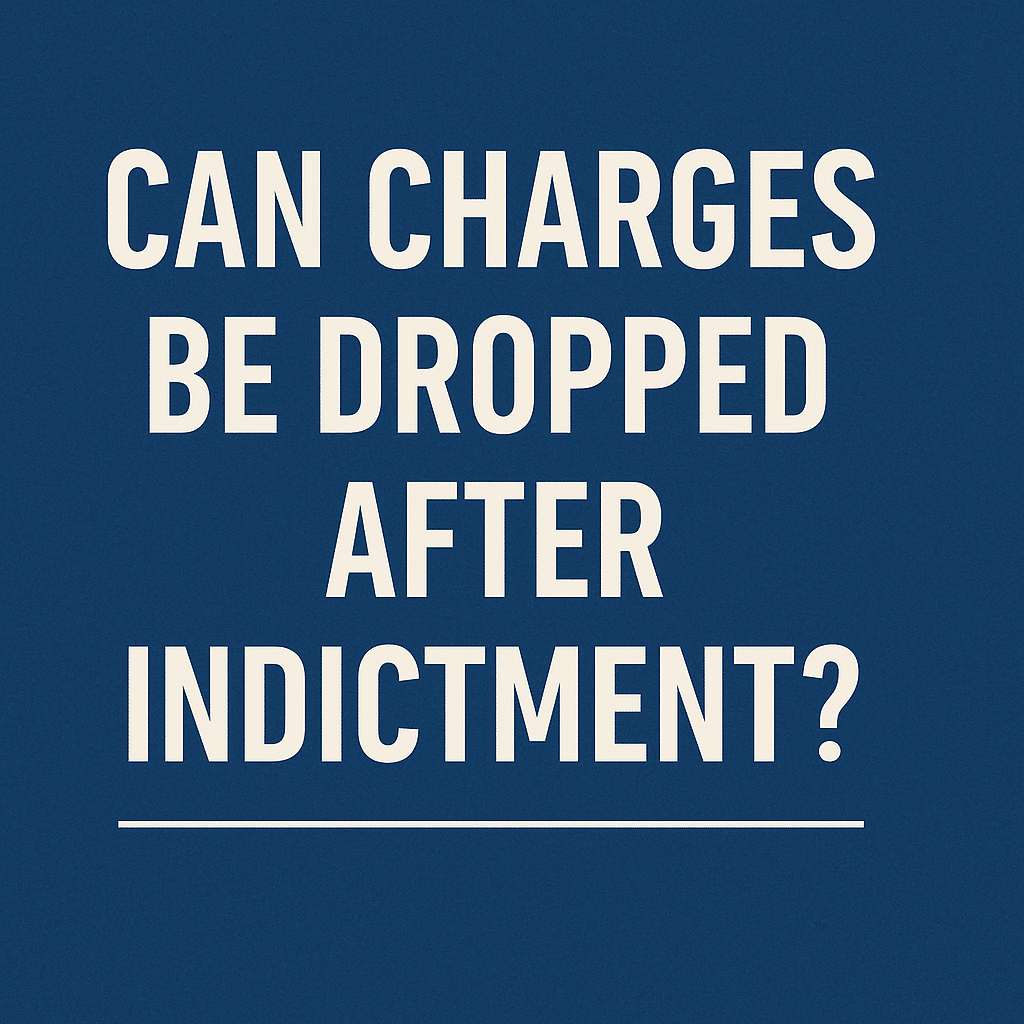
If you or a loved one has been indicted, you may be wondering: Can charges be dropped after an indictment? The short answer is yes—criminal charges can be dismissed even after a grand jury indictment, but it depends on several legal and procedural factors. Here’s what you need to know if you’re facing an indictment in Maryland.
What Does It Mean to Be Indicted?
An indictment is a formal charge issued by a grand jury, typically for serious felonies. In Maryland, indictments are used when the prosecution wants to bypass a preliminary hearing or when a case is already being reviewed by a grand jury. An indictment signals that the state believes it has enough evidence to proceed with prosecution—but that doesn’t mean the case is set in stone.
Can Charges Be Dropped After an Indictment?
Yes. Charges can still be dropped after an indictment, either voluntarily by the prosecutor or by court order under certain circumstances. Here’s how that can happen:
1. Prosecutor Drops the Charges (Nolle Prosequi)
The most common way charges are dropped post-indictment is when the State’s Attorney files a “nolle prosequi”, which is Latin for “will not prosecute.” This is a formal notice filed in court indicating the State has chosen to abandon the charges. Reasons may include:
- Insufficient evidence to support the case
- A key witness recanting or refusing to testify
- New evidence that undermines the prosecution’s theory
- The defendant agrees to a plea deal on lesser charges
- Prosecutorial discretion in the interest of justice
Once the nolle prosequi is filed, the judge will typically accept it, and the charges will be dismissed.
2. Dismissal by the Court
A judge can also dismiss charges after an indictment if there is a legal basis to do so. Common reasons include:
- Violation of constitutional rights (e.g., lack of a speedy trial)
- Defective indictment (e.g., vague or improperly filed)
- Prosecutorial misconduct
- Double jeopardy concerns if the defendant was already tried for the same offense
Such dismissals often require a motion to dismiss filed by the defense.
3. Can the Charges Be Refiled?
In many cases, yes—especially if the charges were dismissed without prejudice. This means the prosecution can refile charges or seek a new indictment if more evidence becomes available or if procedural issues are corrected.
If charges are dismissed with prejudice, they cannot be brought back. This typically happens when the court finds a fundamental flaw or misconduct that prevents a fair trial.
What Happens If the Charges Aren’t Dropped?
If the charges remain after the indictment:
- Your case will proceed to trial in Circuit Court
- Discovery will begin, and both sides will exchange evidence
- Your attorney can still file motions to suppress evidence, seek plea negotiations, or prepare for trial
Why You Need a Criminal Defense Lawyer After an Indictment
Once you’ve been indicted, the stakes are high. You’re now facing felony charges and potential prison time. A skilled Southern Maryland criminal defense lawyer can:
- Review the indictment for legal defects
- Push for early dismissal or charge reduction
- Challenge evidence and protect your rights
- Negotiate a favorable plea agreement
- Represent you confidently in court
Serving Southern Maryland Clients Facing Felony Indictments
At Southern Maryland Criminal Defense, we represent individuals in Charles County, Prince George’s County, Calvert County, and St. Mary’s County who are facing serious felony indictments. We understand how to challenge indictments and get charges dropped when possible.
Schedule a Free Consultation Today
If you’ve been indicted and want to know whether your charges can be dropped, don’t wait. Contact Southern Maryland Criminal Defense today for a confidential consultation. We’ll evaluate your case and build the strongest possible defense from day one.
